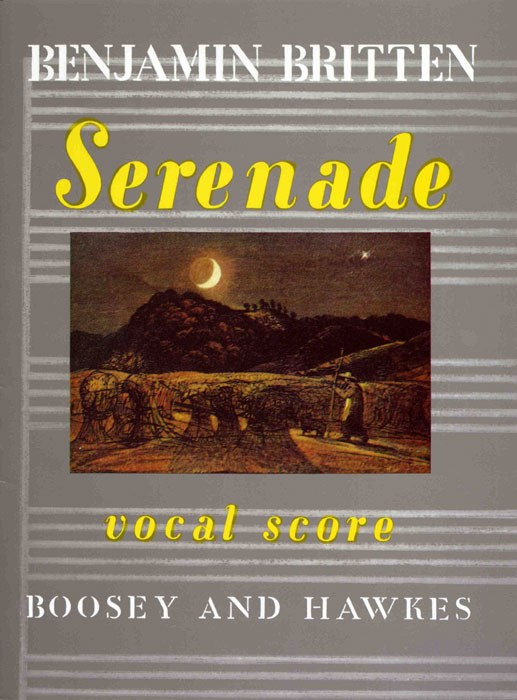 I first heard the music of Benjamin Britten in 1975, a year before he died. I was a sophomore music major at William Jewell College, a school not far from Kansas City. Some long-forgotten magazine piece–probably a review in High Fidelity or Stereo Review, to both of which I subscribed–had made me curious about him, so I drove to a mall in Independence and bought an LP whose first side contained a performance of the Serenade for Tenor, Horn, and Strings by Peter Pears, Barry Tuckwell, and the London Symphony Orchestra. Britten himself was the conductor. The recording was made in 1963, twenty years after the piece was written, and hearing it for the first time that evening was one of the most consequential musical encounters of my youth.
I first heard the music of Benjamin Britten in 1975, a year before he died. I was a sophomore music major at William Jewell College, a school not far from Kansas City. Some long-forgotten magazine piece–probably a review in High Fidelity or Stereo Review, to both of which I subscribed–had made me curious about him, so I drove to a mall in Independence and bought an LP whose first side contained a performance of the Serenade for Tenor, Horn, and Strings by Peter Pears, Barry Tuckwell, and the London Symphony Orchestra. Britten himself was the conductor. The recording was made in 1963, twenty years after the piece was written, and hearing it for the first time that evening was one of the most consequential musical encounters of my youth.
The Serenade starts off with a mysterious-sounding unaccompanied horn solo, followed by a setting of part of The Evening Quatrains, a lyric by Charles Cotton, a near-forgotten seventeenth-century English writer. Britten cut the poem in half and called his shortened version “Pastoral”:
The day’s grown old; the fainting sun
Has but a little way to run,
And yet his steeds, with all his skill,
Scarce lug the chariot down the hill.
The shadows now so long do grow,
That brambles like tall cedars show;
Mole hills seem mountains, and the ant
Appears a monstrous elephant.
A very little, little flock
Shades thrice the ground that it would stock;
Whilst the small stripling following them
Appears a mighty Polypheme.
And now on benches all are sat,
In the cool air to sit and chat,
Till Phoebus, dipping in the West,
Shall lead the world the way to rest.
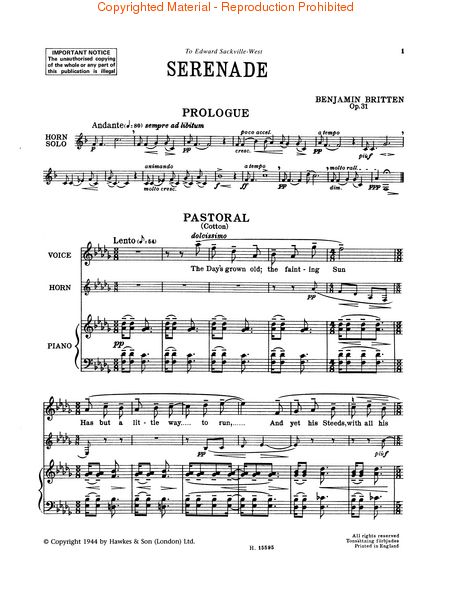 Rarely in my life have I been so instantaneously overwhelmed as I was by “Pastoral,” though a few more years would go by before I attained sufficient musical sophistication to be able to fully understand why it had hit me so hard. It doesn’t look like much on the page, just a simple tune shared by the singer and horn player, accompanied by four-part string chords. Yet those deceptively uncomplicated-looking chords are anything but straightforward. Here as in his other middle-period masterpieces, Britten used tonal harmony with a piquant freshness and sense of surprise that were all his own.
Rarely in my life have I been so instantaneously overwhelmed as I was by “Pastoral,” though a few more years would go by before I attained sufficient musical sophistication to be able to fully understand why it had hit me so hard. It doesn’t look like much on the page, just a simple tune shared by the singer and horn player, accompanied by four-part string chords. Yet those deceptively uncomplicated-looking chords are anything but straightforward. Here as in his other middle-period masterpieces, Britten used tonal harmony with a piquant freshness and sense of surprise that were all his own.
“I need more chords,” Aaron Copland complained to Leonard Bernstein toward the end of his composing career. “I’ve run out of chords.” To listen to “Pastoral” is to realize that there will always be enough chords. All you have to do is know where to look.
These opening bars remind me of something that Britten said a year after he recorded the Serenade:
What is important in the arts is not the scientific part, the analyzable part of music, but the something which emerges from it but transcends it, which cannot be analyzed because it is not in it, but of it. It is the quality which cannot be acquired by simply the exercise of a technique or a system: it is something to do with personality, with gift, with spirit. I quite simply call it–magic: a quality which would appear to be by no means unacknowledged by scientists, and which I value more than any other part of music.
Back then I was still grabbing at classical music with both hands, and few weeks passed without my making a major discovery of some kind or other, most of which turned out before long to be…well, something less than major. But I was certain that my discovery of the magical “Pastoral” was more than just another passing fancy. It spoke to me, as did the rest of the Serenade, with a directness and immediacy not unlike the miraculous sensation of falling in love at first sight (something that had yet to happen to me). I knew beyond doubt that whoever Benjamin Britten was, his music would henceforth play an important part in my life–and so it did, and does.
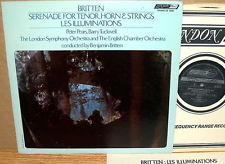 Years later Britten’s 1963 recording of the Serenade for Tenor, Horn, and Strings would become one of the very first compact discs that I bought. Not only do I still have that CD, but I played it for Mrs. T last night, and she was as thunderstruck by her first hearing of the Serenade as I was thirty-nine years ago.
Years later Britten’s 1963 recording of the Serenade for Tenor, Horn, and Strings would become one of the very first compact discs that I bought. Not only do I still have that CD, but I played it for Mrs. T last night, and she was as thunderstruck by her first hearing of the Serenade as I was thirty-nine years ago.
“Why haven’t you played this for me until now?” she asked.
“I guess I just didn’t think to,” I replied with a touch of embarrassment. “But I’m glad I finally got around to it.”
* * *
Ian Bostridge, Radovan Vlatkovic, and the Norwegian Chamber Orchestra perform the prologue and “Pastoral” from Britten’s Serenade for Tenor, Horn, and Strings:

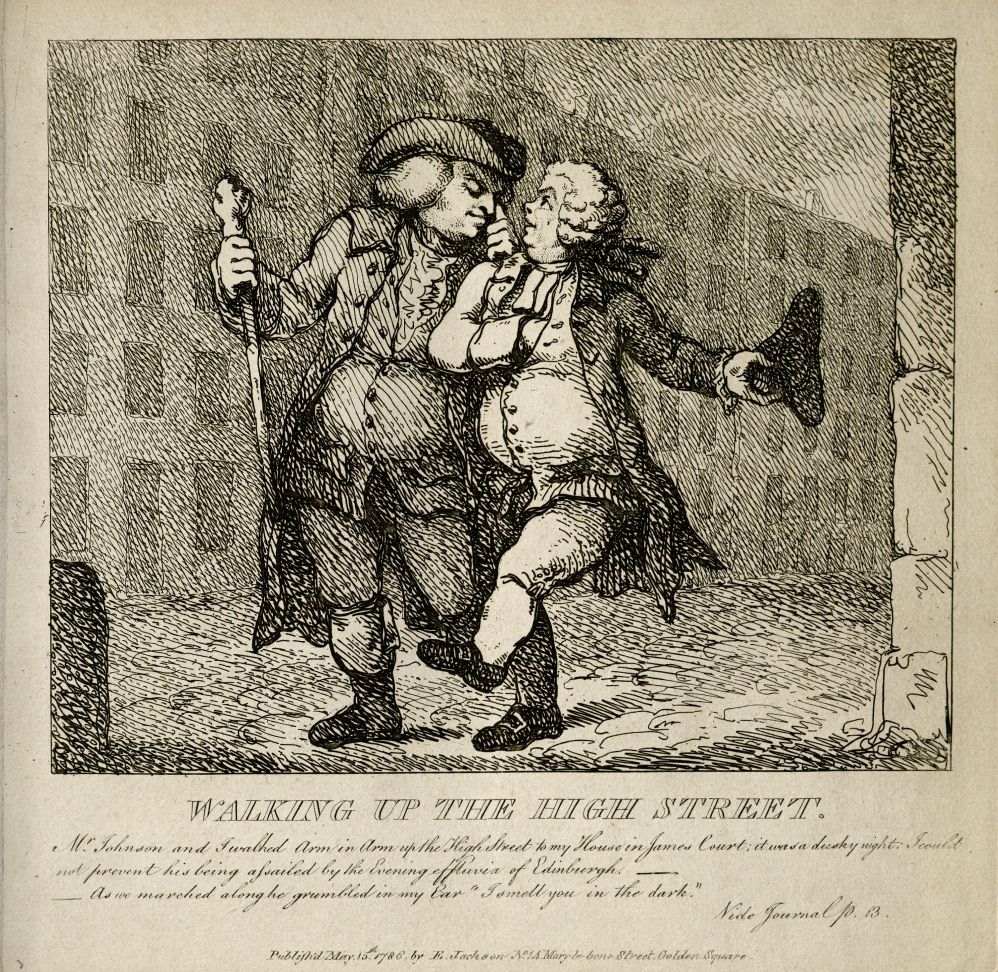 This reminds me of an oft-quoted passage from Boswell’s Life of Johnson:
This reminds me of an oft-quoted passage from Boswell’s Life of Johnson: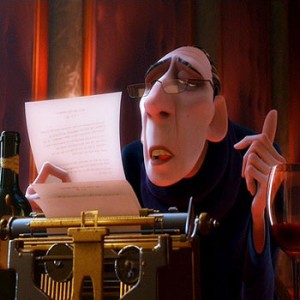 When it comes to reviews, on the other hand, I try to take the advice that I give to others, which is the same advice given by André Previn in No Minor Chords: “It is perfectly correct to disregard all the bad reviews one gets, but only if at the same time, one disregards the good ones as well.” As Dr. Johnson told Boswell on another occasion, there’s an end on’t. Sure, I love getting good reviews, but I do my best not to take them to heart. As for the pans, of which I’ve gotten my share over the years, I ignore them. Either way, nobody has ever said anything about me in print, good or bad, that I can quote from memory. (You might be surprised to know how many artists can rattle off a perfectly remembered phrase from a bad review that came out a decade ago.)
When it comes to reviews, on the other hand, I try to take the advice that I give to others, which is the same advice given by André Previn in No Minor Chords: “It is perfectly correct to disregard all the bad reviews one gets, but only if at the same time, one disregards the good ones as well.” As Dr. Johnson told Boswell on another occasion, there’s an end on’t. Sure, I love getting good reviews, but I do my best not to take them to heart. As for the pans, of which I’ve gotten my share over the years, I ignore them. Either way, nobody has ever said anything about me in print, good or bad, that I can quote from memory. (You might be surprised to know how many artists can rattle off a perfectly remembered phrase from a bad review that came out a decade ago.)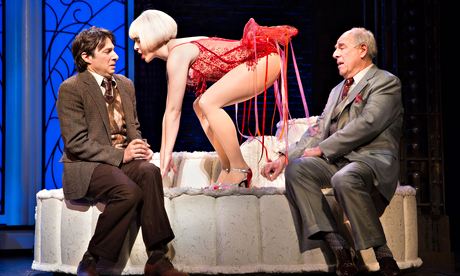 Ms. Stroman hasn’t rung the bell on Broadway since “Young Frankenstein,” but she remains peerless when it comes to comic choreography, and “Bullets” overflows with clever dances, including a feature for Heléne Yorke set to a 1927 double-entendre ditty called “I Want a Hot Dog for My Roll” that’s as naughty as you’d expect. Here and elsewhere, the gorgeously brassy Ms. Yorke steals the show from her better-known colleagues, but she has plenty of competition…
Ms. Stroman hasn’t rung the bell on Broadway since “Young Frankenstein,” but she remains peerless when it comes to comic choreography, and “Bullets” overflows with clever dances, including a feature for Heléne Yorke set to a 1927 double-entendre ditty called “I Want a Hot Dog for My Roll” that’s as naughty as you’d expect. Here and elsewhere, the gorgeously brassy Ms. Yorke steals the show from her better-known colleagues, but she has plenty of competition…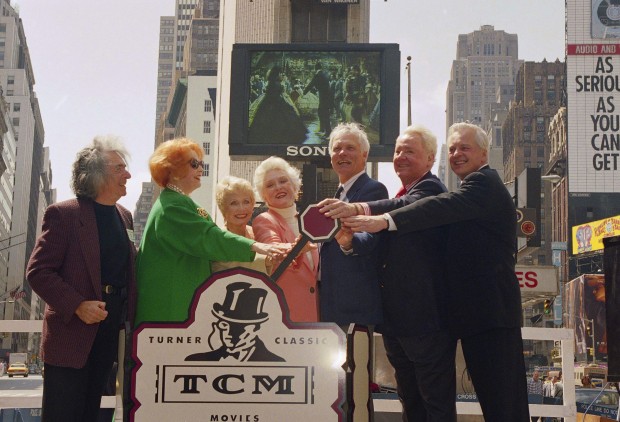 I doubt I’m the only viewer who routinely flicks through the coming month’s fare and earmarks a half-dozen films at a time for future recording. I am, in short, an ardent fan–but I wonder what the future holds in store for the channel that made Robert Osborne, TCM’s host-in-chief, a star. Will it continue to prosper? Or is TCM’s business model flawed in ways that could lead to its decline and fall?
I doubt I’m the only viewer who routinely flicks through the coming month’s fare and earmarks a half-dozen films at a time for future recording. I am, in short, an ardent fan–but I wonder what the future holds in store for the channel that made Robert Osborne, TCM’s host-in-chief, a star. Will it continue to prosper? Or is TCM’s business model flawed in ways that could lead to its decline and fall?